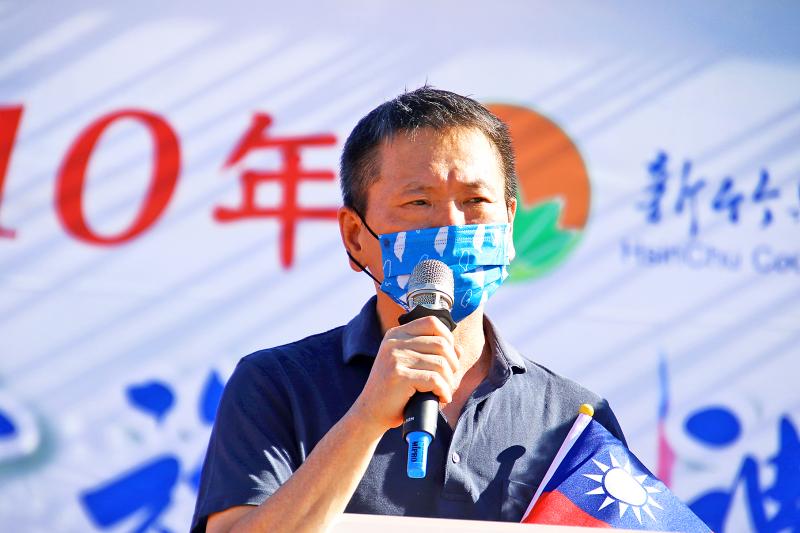Politicians yesterday denounced a Chinese state media report that labeled two Chinese Nationalist Party (KMT) legislators as “secret Taiwanese independence advocates,” saying that if its interpretation were true, it would be describing most Taiwanese.
KMT legislators Lin Wei-chou (林為洲) and Charles Chen (陳以信) were on Saturday named by the People’s Political Consultative Daily as members of a “secret” faction of independence advocates.
The article asserted the presence of two independence “forces” in Taiwan, one overt and one covert.

Photo: Huang Mei-chu, Taipei Times
Certain KMT members comprise the “secret” faction, which extolls “one China,” while in reality colluding with external antagonists to act against Chinese in the name of being anti-communist, the paper wrote.
The harm of this faction on cross-strait relations exceeds even that of “overt” forces, mainly comprised of Democratic Progressive Party (DPP) members, the Chinese People’s Political Consultative Conference publication said.
The report comes after three top DPP politicians in November last year were sanctioned by Beijing as “diehard separatists,” although the naming of KMT members marks a departure from its usual targets.
Reacting to the report yesterday, Lin and Chen said that they support the Republic of China (ROC).
The ROC is a sovereign and independent nation, Lin told reporters, adding that if this is considered “Taiwanese independence,” then it would describe the vast majority of Taiwanese.
He said that he hopes for peace and coprosperity across the Taiwan Strait, but calm cannot describe the current situation of worsening military incursions by China.
Chen declined to comment on the report, but said that he is the ROC’s biggest proponent and the biggest opponent of independence.
Support for the ROC does not equate to being anti-Chinese, he added.
The path forward for the KMT involves growing closer to the US and being more amicable with China, Chen said, adding that he has in recent years helped advance party relations with the US and called for a more balanced outreach to the US and China.
Beijing should not regard the pursuit of cross-strait stability and balance as “anti-Chinese,” he said, calling it a serious misjudgement of the situation.
The official position of the KMT is to defend the ROC, and uphold freedom and democracy, while prioritizing the interests of Taiwanese, KMT Chairman Eric Chu (朱立倫) told reporters while visiting the National Policy Foundation.
Peace is the shared responsibility of all, he said, calling on all sides to exercise restraint.
Meanwhile, DPP Legislator Hsu Chih-chieh (許智傑) said that the article is merely an attempt to provoke and divide Taiwanese.
To the Chinese Communist Party, supporting the “ROC” and supporting “Taiwan” are both separatist actions, Hsu said.
Extensive debates about what constitutes independence or unification have allowed China to set its own definition, which clearly differs from that held by the KMT, DPP Legislator Cheng Yun-peng (鄭運鵬) told a news conference on polling results.
“I do not know the basis of the paper’s argument, but the DPP will defend freedom of speech, no matter the speaker’s political inclination,” he said, adding that this includes the KMT.

Nipah virus infection is to be officially listed as a category 5 notifiable infectious disease in Taiwan in March, while clinical treatment guidelines are being formulated, the Centers for Disease Control (CDC) said yesterday. With Nipah infections being reported in other countries and considering its relatively high fatality rate, the centers on Jan. 16 announced that it would be listed as a notifiable infectious disease to bolster the nation’s systematic early warning system and increase public awareness, the CDC said. Bangladesh reported four fatal cases last year in separate districts, with three linked to raw date palm sap consumption, CDC Epidemic Intelligence

The manufacture of the remaining 28 M1A2T Abrams tanks Taiwan purchased from the US has recently been completed, and they are expected to be delivered within the next one to two months, a source said yesterday. The Ministry of National Defense is arranging cargo ships to transport the tanks to Taiwan as soon as possible, said the source, who is familiar with the matter. The estimated arrival time ranges from late this month to early next month, the source said. The 28 Abrams tanks make up the third and final batch of a total of 108 tanks, valued at about NT$40.5 billion

Two Taiwanese prosecutors were questioned by Chinese security personnel at their hotel during a trip to China’s Henan Province this month, the Mainland Affairs Council (MAC) said yesterday. The officers had personal information on the prosecutors, including “when they were assigned to their posts, their work locations and job titles,” MAC Deputy Minister and spokesman Liang Wen-chieh (梁文傑) said. On top of asking about their agencies and positions, the officers also questioned the prosecutors about the Cross-Strait Joint Crime-Fighting and Judicial Mutual Assistance Agreement, a pact that serves as the framework for Taiwan-China cooperation on combating crime and providing judicial assistance, Liang

A group from the Taiwanese Designers in Australia association yesterday represented Taiwan at the Midsumma Pride March in Melbourne. The march, held in the St. Kilda suburb, is the city’s largest LGBTQIA+ parade and the flagship event of the annual Midsumma Festival. It attracted more than 45,000 spectators who supported the 400 groups and 10,000 marchers that participated this year, the association said. Taiwanese Designers said they organized a team to march for Taiwan this year, joining politicians, government agencies, professionals and community organizations in showing support for LGBTQIA+ people and diverse communities. As the first country in Asia to legalize same-sex